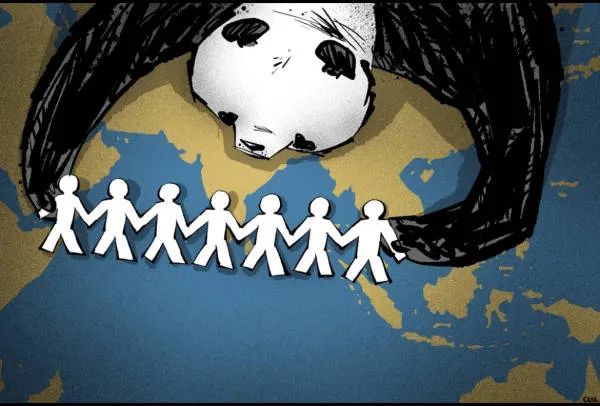
In response to the Houthis attacking ships in the Red Sea bound for Israel, the US recently announced Operation Prosperity Guardian, a security initiative that initially included more than 20 countries, such as Bahrain, Britain, Canada, France, Italy, the Netherlands, Norway, Seychelles and Spain.
But France, Italy and Spain have reportedly dropped out of the US-led coalition and many others decline to acknowledge their involvement. That Bahrain is the only Arab state offering public support speaks volumes about the Arab world’s apathy towards the US – if not resentment of America’s strong support for Israel’s war on Hamas.
This does not look like the “broadest possible” coalition US Secretary of State Antony Blinken has called for. Unlike the counter-piracy initiative in the Gulf of Aden, none of America’s Asian allies and partners appear to have turned up this time.
It is strange to hear the US call on Beijing to play “a constructive role in trying to prevent those attacks from taking place”. China should have no such influence on the Houthis, a Yemeni militant group. Instead, should the Chinese naval flotilla operating in the Bab-el-Mandeb strait join the American-led operation, it would compromise China’s position on the Israel-Hamas war and endanger Chinese ships.
If there are still Chinese merchant ships sailing through the Red Sea, the Chinese flotilla should sail northwards to protect them, of course. Chinese warships have previously sailed from the Gulf of Aden to evacuate Chinese nationals from war-torn Libya, Yemen and Sudan.
But should Chinese warships strike back against a Houthi attack on a Chinese vessel, China could be drawn into a conflict in a most volatile region. The Houthis have vowed to continue their Red Sea attacks until Israel stops fighting in Gaza.
So how can the People’s Liberation Army (PLA) protect China’s overseas interests without becoming embroiled in regional conflicts?
China is the world’s top trader and most of the international trade goes by sea. About 12 per cent of global trade passes through the Red Sea with about 62 per cent of China’s oil and 17 per cent of its natural gas imports going through the Malacca Strait and South China Sea.
Reuters journalist Greg Torode recently argued that the Indian Ocean could be Beijing’s Achilles’ heel in a Taiwan war because, apart from its Djibouti military base, China has no air cover from land or sea for Indian Ocean naval deployments. This brings to mind two myths about China’s Indian Ocean strategy: the “ string of pearls” and so-called Malacca dilemma.
The first, a 2004 hypothesis, assumed that China aimed to build a string of military bases and monitoring stations to support its naval outreach up to the Horn of Africa. The Malacca dilemma points to China vulnerabilities should the US blockade the Malacca Strait in a war, cutting off China’s trade flows.
But two decades later, the string of pearls is nowhere to be found. Instead, a Maritime Silk Road is linking Chinese ports to a string of commercial ports: Piraeus in Greece, Kyaukpyu in Myanmar, Gwadar in Pakistan and Colombo and Hambantota in Sri Lanka.
We can’t know if the US would blockade the Malacca Strait but neither is there a guarantee of war in the Taiwan Strait. Beijing still talks about a peaceful reunification with Taiwan. A Malacca Strait blockade would cripple the economies of littoral states such as Thailand, Indonesia, Singapore and Malaysia. It would deal a heavy blow to Japan and South Korea, US allies that depend more heavily than China on the security of the strait.
Precisely because of the extreme importance of the Malacca Strait to China, a war triggered by an American blockade is unlikely to end there. If a war between China and the US involved the Indian Ocean, the conflict would have become uncontrollable – it would be a major war involving a lot of countries. The rest is up to everybody’s imagination.
On the face of it, the PLA Navy, albeit the largest in the world, does indeed look vulnerable in the Indian Ocean. Building a military base in a foreign land requires the permission of the country involved. Even if some countries are happy to accommodate, how would they resist pressure from, say, the US or India that sees itself as the “ net security provider” in the Indian Ocean?
But Beijing’s so-called vulnerability may not be a disadvantage. The PLA’s operations abroad are all humanitarian in nature, be it peacekeeping, vessel protection or disaster relief. So long as Beijing exclusively restricts its military operations to protecting its interests and providing humanitarian assistance when necessary, then China does not need a lot of military bases that are hugely costly and difficult to maintain.
Short of bases overseas, the Chinese navy has to maximise cooperation with other stakeholders. In countering piracy, although China’s flotillas work independently, they share information and coordinate with coalitions such as Nato, the Combined Maritime Forces, EU Atalanta and other independent deployers.
In recent years, the PLA’s naval vessels have conducted joint exercises with the Russian, Iranian and Pakistani navies in the Indian Ocean. Joint exercises have also been conducted with the United Arab Emirates and Saudi Arabia.
The best way to protect Chinese interests overseas is to blend them with the interests of others. Beijing does not need to look elsewhere for inspiration. Since 2008, Chinese flotillas have escorted some 7,200 ships transiting the Indian Ocean, including foreign ships. If the western Pacific Ocean is where China has to defend its sovereign rights, then the Indian Ocean looks more like a test ground for what a stronger China might mean for others.
